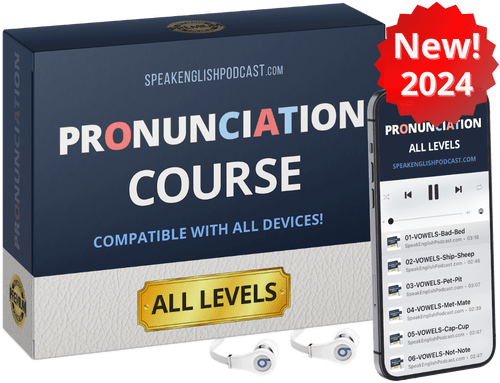#293 English expressions - Good for you!
Transcript:
Hi! I’m Georgiana, and I’m back with a new episode. I’m here to help you speak English fluently. And what do you need to speak fluently? You need to LISTEN, LISTEN, LISTEN, and LISTEN. 🙂
If you want to help me, SHARE the podcast with your friends and family. That would mean a lot. Thanks.
On my website you can get the 5 Secrets to speak English, and also my premium courses.
Before we start, get the transcript at SpeakEnglishPodcast.com/podcast
It’s completely free!
Ok, let’s start!
Learning English is exciting because we get to know how people actually speak. Today, we will look at a common phrase in the US: “Good for you!” It’s a friendly way to talk, but there’s more to learn about it.
What Does “Good for you!” Mean?
When people say “Good for you!” they show they are glad for someone else. Imagine giving a friend a thumbs-up. For example, if your friend tells you they did well on a test, saying “Good for you!” is like saying, “I’m happy for you!”
When You Are Really Glad:
Imagine your friend telling you, “I got first place!” You can respond with a smile, “Good for you!” to show your happiness for their success.
How You Say It Is Key:
Your tone of voice can change the meaning. Use a cheerful tone to make sure your friend feels your sincerity.
When to Say “Good for you!”
This phrase fits well in many situations. Here are some moments to use it:
Celebrating Achievements:
When someone achieves something from hard work, like scoring high on a test, “Good for you!” is a great response.
Sharing in Good News:
Hearing about a friend’s good news, like getting a new pet, and saying “Good for you!” shows you share their happiness.
Let’s Practice:
Imagine a time when someone shared something joyful with you. How would you reply? Simple, “Good for you!” Just remember, saying it with a smile and warmth in your voice can really make a difference.
The Different Meanings of “Good for you!”
Sometimes, “Good for you!” is not only about being happy for someone. It can also be used for jokes or in not-so-nice ways, known as sarcasm.
When It’s Just a Joke:
Friends might use it playfully when someone says something funny or not so-important. It’s their way of being friendly.
When It Might Not Be Kind:
However, if someone’s tone sounds unhappy or their expression appears unfriendly, they might not be saying it kindly. For example, if you say, “I can tie my shoes,” and someone responds with, “Good for you!” without a friendly tone, they might not be being nice. They could be mocking you because tying shoes is something most people can do.
Understanding the Difference:
Listen to their voice: Is it light, happy, or flat and unkind?
Look at their expression: Is there a real smile, or do they seem insincere?
Consider what you said: Was it something impressive or ordinary? This helps you figure out if they’re joking or not.
Some Examples:
Happy: You: “I aced my test!” Friend: “Good for you!” (They’re genuinely pleased.)
Joking: You: “I spent the whole day watching TV.” Friend: “Good for you!” (They’re playfully teasing because it’s not a big deal.)
Not Nice: You: “I cleaned up my room today.” Friend: “Well, good for you.” (If their tone is sarcastic, they may not think it’s important.)
That’s why, it’s crucial to pay attention to how people say things, not just the words. This helps you know if they’re truly happy for you, making a joke, or being unkind.
Let’s continue with a surprising point-of-view story:
POV-Story
(Learn grammar in context)
I will tell you the same story twice. So, make sure to focus on the changes.
You can find these techniques fully implemented in my premium courses.
SpeakEnglishPodcast.com/courses
Okay! Let’s start!
Dan was from a faraway place and was still learning English. He loved to try using new English words with his customers.
One day, someone was captivated by Dan’s cherry pie. ‘Good for you, Dan! This is the best pie ever!’ the customer exclaimed. Dan, misinterpreting the phrase, thought it meant the pie was healthy. ‘Oh, my pies make people healthy!’ Dan chuckled, unaware of his linguistic mixup.
Dan decided to make a very special pie. He thought, “I will make a very healthy pie.” He put in kale, beets, and spinach; and called “super pie.” He thought everyone in town would love it because it was “good for them.”
The day came to show the “super pie” to the town. People tried it, but they made funny faces. The pie was so different. “It’s… interesting,” said one person, trying to be nice.
Later, Ellie who was a teacher, talked to Dan. She explained that “Good for you” was a way to say “well done” or “I’m happy for you.” It didn’t mean the pie was healthy.
Dan was surprised but then laughed. He understood his mistake. He went back to making his delicious cherry pies. But he kept one “super pie” in his shop. It was a fun reminder that sometimes he might get English phrases mixed up.
Dan learned that it’s okay to make mistakes when learning something new. The people of Maplewood still loved his baking, even the “super pie.” Dan kept learning English, and everyone smiled when remembering the “super pie” story.
In the future
Dan will be from a faraway place and will still be learning English. He will love to try using new English words with his customers.
One day, a someone will be captivated by Dan’s cherry pie. ‘Good for you, Dan! This will be the best pie ever!’ the customer will exclaim. Dan will think that the pie is healthy. ‘Oh, my pies will make people healthy!’ He will think, not knowing he made a language mistake.
So, Dan will decide to make a very special pie. He will think, “I will make a very healthy pie.” He will put in kale, beets, and spinach; and will call it his “super pie.” He will think everyone in Maplewood will love it because it will be “good for them.”
The day will come to show the “super pie” to the town. People will try it, but they will make funny faces. The pie will be so different. “It’s… interesting,” someone will say, trying to be nice.
Later, Ellie, a teacher, will talk to Dan. She will explain that “Good for you” will be a way to say “well done” or “I’m happy for you.” It won’t mean the pie is healthy.
Dan will be surprised but then will laugh. He will understand his mistake. He will go back to making his delicious cherry pies. But he will keep one “super pie” in his shop. It will be a fun reminder that sometimes he might get English phrases mixed up.
Dan will learn that it will be okay to make mistakes when learning something new. The people of Maplewood will still love his baking, even the “super pie.” Dan will keep learning English, and everyone will smile when remembering the “super pie” story.
Great! I like these kinds of stories because they’re easy to remember and help a lot with learning English. Humor also makes learning more enjoyable. You can find this method in my premium courses—take a look at:
SpeakEnglishPodcast.com/courses, to get my premium courses. They are designed for learning by listening.
Also, if you want to help me, share the podcast with your friends and family. That would mean a lot. Thanks.
See you soon!
Bye! Bye!




0 Comments